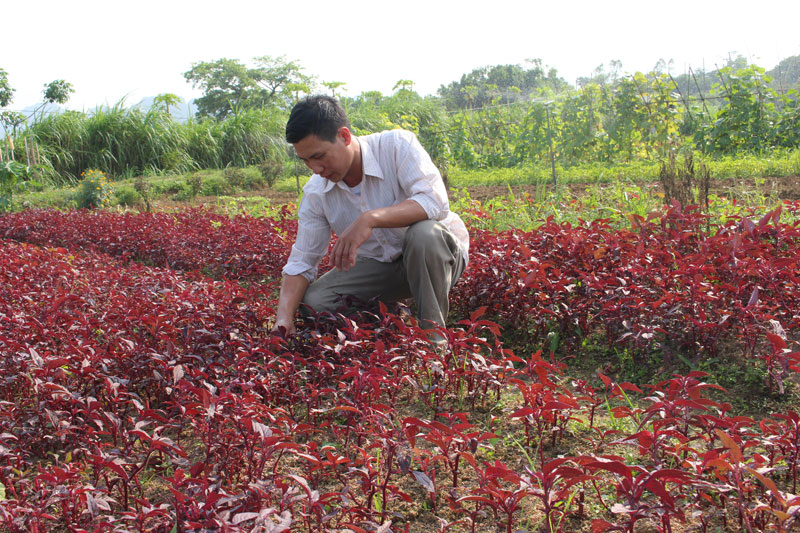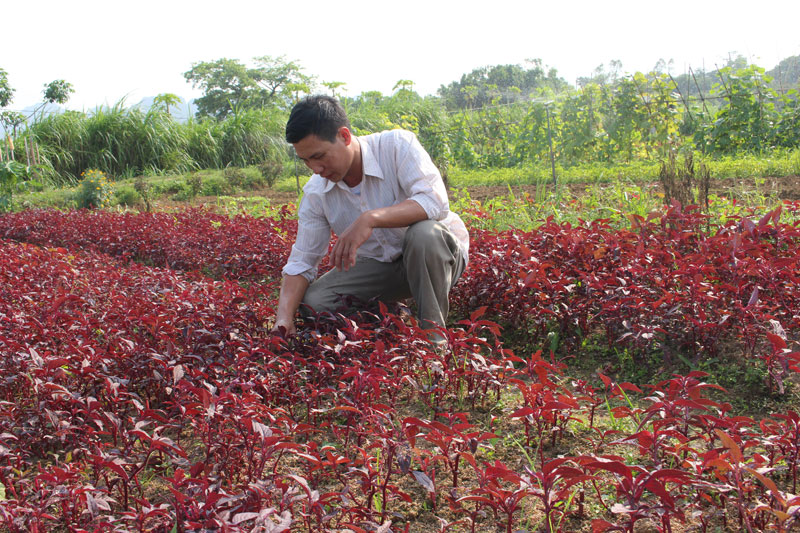
(HBO) - In recent years, Tan Thanh Commune Farmer Association (Luong Son) has coordinated with the community study centers, branches and mass organizations, especially the District Farmer Association, to organize vocational training courses and job consultancy for farmers. According to the statistics of the period from 2014 to 2018, the Association has opened 56 classes for 3,560 members as farmers to participate. As a result, there has been an increase in the proportion of farmer members getting jobs, increasing their income, creating more jobs and employing about 400 people every year, earning the average of 4.5 - 5 million VND per person per month.

A farmer
member of Dong Suong village, Tan Thanh commune (Luong Son) with rotational
farming produces organic products with stable output, average income of 400
million VND / hectare.
It is
known that, in job counseling and vocational training, Tan Thanh Commune
Farmers Association attaches special importance to providing suitable job
opportunities which are suitable to the conditions of the social life and the
level of farmers to bring the best efficiency. The main types of training are
farming and animal husbandry, including 25 intensive technical classes for
planting maize, rice and vegetables; 22 classes of raising sows, breeding cows,
gardening chickens; 1 class of rattan - bamboo knit; 6 classes of planting
fruit trees and two classes of organic farming training. Fro there, this work
has met the production needs of the members, to guide and support for the
farmer members to build economic models in accordance with their aspirations,
according to the direction of the locality in the implementation of the
agricultural restructuring program. On the other hand, through the propaganda
and introduction of programs and projects of enterprises who desire to link the
production; the problem of consumption of agricultural and forestry products of
farmers is solved in the trend of stability.
The
whole commune currently has dozens of models of breeding sows, breeding
chickens, laying hens with average income of VND 400-600 million / year; the
models of planting and raising husbandry
have also been developed with 6 productions and supply firms and 8 block
brick production facilities. In the area, the members of the farmers have
diversified economic development models, bringing into full play their local
potentials and strengths. There are 23 service households, 99 livestock
households, 66 farming households, 50 households of planting citrus trees. In
92 hectares of citrus, 29 hectares were harvested with the average income of
400 million VND / hectare. Through vocational counseling and vocational
training, the Association has helped 2,558 people to have jobs. More than 400
households have made a great effort to strive for good production and business
after vocational training courses.
According to data from the Hoa Binh Provincial Party Committee, the industrial production index for the first six months of 2025 is estimated to have increased by 20% compared to the same period last year. This marks the highest year-on-year growth rate for this period since 2020.
In the first six months of 2025, Hoa Binh province’s export turnover was estimated at 1.145 billion USD, marking an 18.11% increase compared to the same period in 2024. Import turnover was estimated at $ 804 million, a 17.15% increase, which helped the province maintain a positive trade balance.
The lives of the ethnic minority farmers in Tan Lac district have gradually improved thanks to the new directions in agricultural production. This is a testament to the collective strength fostered through the professional associations and groups implemented by various levels of the district’s Farmers’ Union.
With the motto the "product quality comes first,” after nearly one year of establishment and operation, Muong village’s Clean Food Agricultural and Commercial Cooperative, located in Cau Hamlet, Hung Son Commune (Kim Boi district), has launched reputable, high-quality agricultural products to the market that are well-received by consumers. The products such as Muong village’s pork sausage, salt-cured chicken, and salt-cured pork hocks have gradually carved out a place in the market and they are on the path to obtaining the OCOP certification.
In the past, the phrase "bumper harvest, rock-bottom prices" was a familiar refrain for Vietnamese farmers engaged in fragmented, small-scale agriculture. But today, a new spirit is emerging across rural areas of Hoa Binh province - one of collaboration, organisation, and collective economic models that provide a stable foundation for production.
Maintaining growing area codes and packing facility codes in accordance with regulations is a mandatory requirement for agricultural products to be eligible for export. Recently, the Department of Agriculture and Environment of Hoa Binh province has intensified technical supervision of designated farming areas and packing facilities to safeguard the "green passport" that enables its products to access international markets.



